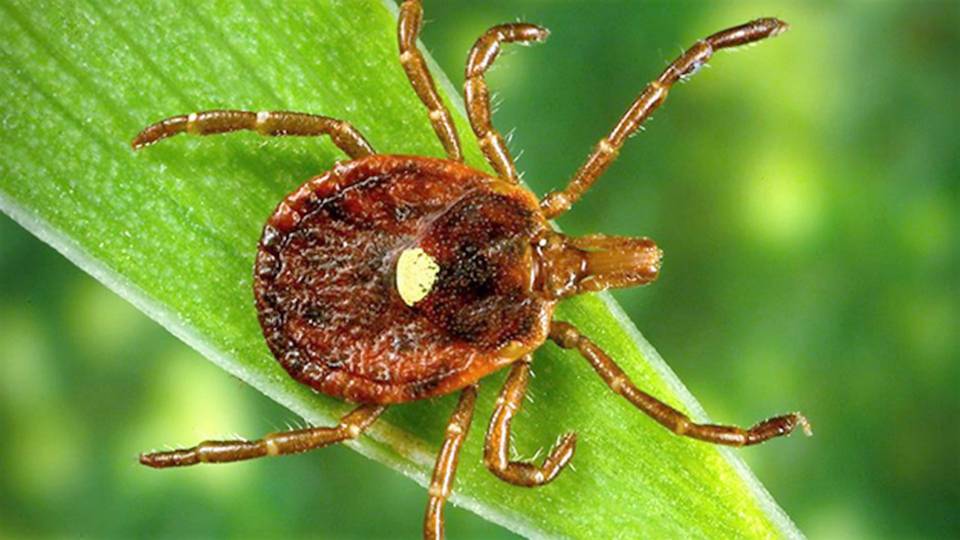Oh, Lovely: The Tick that Gives People Meat Allergies is Spreading
First comes the unscratchable itching, and the angry blossoming of hives. Then stomach cramping, and—for the unluckiest few—difficulty breathing, passing out, and even death. In the last decade and a half, thousands of previously protein-loving Americans have developed a dangerous allergy to meat. And they all have one thing in common: the lone star tick.
Red meat, you might be surprised to know, isn’t totally sugar-free. It contains a few protein-linked saccharides, including one called galactose-alpha-1,3-galactose, or alpha-gal, for short. More and more people are learning this the hard way, when they suddenly develop a life-threatening allergy to that pesky sugar molecule after a tick bite.
Yep, one bite from the lone star tick—which gets its name from the Texas-shaped splash of white on its back—is enough to reprogram your immune system to forever reject even the smallest nibble of perfectly crisped bacon. For years, physicians and researchers only reported the allergy in places the lone star tick calls home, namely the southeastern United States. But recently it’s started to spread. The newest hot spots? Duluth, Minnesota, Hanover, New Hampshire, and the eastern tip of Long Island, where at least 100 cases have been reported in the last year. Scientists are racing to trace its spread, to understand if the lone star tick is expanding into new territories, or if other species of ticks are now causing the allergy.
The University of Virginia is deep in the heart of lone star tick country. It’s also home to a world-class allergy research division, headed up by immunologist Thomas Platts-Mills. He’d been hearing tales of the meat allergy since the ’90s—people waking up in the middle of the night after a big meal, sweating and breaking out in hives. But he didn’t give it much thought until 2004, when he heard about another group of patients all suffering from the same symptoms.
This time, it wasn’t a plate of pork chops they shared; it was a new cancer drug called cetuximab. The drug worked, but curiously, patients that lived in the southeast were 10 times as likely to report side effects of itching, swelling, and a dangerous drop in blood pressure.
Platts-Mills teamed up with cetuximab’s distributor, Bristol-Myers Squibb, and began comparing patient blood samples. He discovered that all the patients who experienced an allergic reaction had pre-existing antibodies to alpha-gal, and cetuximab was full of the stuff, thanks to the genetically modified mice from which it was derived. With that mystery solved, Platts-Mills turned to figuring out what made patients so sensitive to alpha-gal.
The best hint he had was the geographic overlap between the cetuximab patients and previously reported meat allergies. The area perfectly matched where people came down with Rocky Mountain spotted fever—a disease carried by the lone star tick. But it wasn’t until Platts-Mills and two of his lab members came down with tick-induced meat allergies of their own that they made the connection.
Over the next few years Platts-Mills and his colleague Scott Commins screened more meat allergy patients and discovered that 80 percent reported being bitten by a tick.What’s more, they showed that tick bites led to a 20-fold increase in alpha-gal antibodies. Since ethics standards prevented them from attaching ticks to randomized groups of patients, this data was the best they could do to guess how meat allergy arises. Something in the tick’s saliva hijacks humans’ immune systems, red-flagging alpha-gal, and triggering the massive release of histamines whenever red meat is consumed.
Researchers are still trying to find what that something is. Commins has since moved to the University of North Carolina, where he’s injecting mice with lone star tick extracts to try to understand which molecules are setting off the alpha-gal bomb. It’s tricky: Tick saliva is packed with tons of bioactive compounds to help the parasite feed without detection. One of them might be an alpha-gal analogue—something similar-but-different-enough in shape that it sets off the human immune system. But it could also be a microbe—like a bacteria or virus—that triggers the response. Some have even suggested that residual proteins from the ticks’ earlier blood meals could be the culprit.
Whatever it is, allergy researchers will be paying attention. Because, as far as anyone can tell, alpha-gal syndrome seems to be the only allergy that affects all people, regardless of genetic makeup. “There’s something really special about this tick,” says Jeff Wilson, an asthma, allergy, and immunology fellow in Platts-Mills’ group. Usually a mix of genes and environmental factors combine to create allergies. But when it comes to the lone star tick it doesn’t matter if you’re predisposed or not. “Just a few bites and you can render anyone really, really allergic,” he says.
In the meantime, Platts-Mills, Commins, and Wilson are busy communicating the scale of the public health problem. Every day they check local news headlines to log new cases of catastrophic hamburger aversion, and spend hours on the phone gathering the latest intel from allergy clinics and academic centers around the country. They’re building the first real red meat allergy incidence map of the US—because state health departments aren’t required to report alpha-gal syndrome to the Centers for Disease Control and Prevention. And it’s still rare enough outside the southeastern US that many doctors don’t correctly diagnose it.
Wilson is trying to get blood samples from all the new outbreaks, to figure out if the patients’ antibodies correspond to the saliva of lone star ticks or a different tick species. That will tell him if the increases in the allergy are the result of changing range patterns, or if other ticks have developed the capacity to rewire human immune systems in the same way. That information would also provide further clues to the mechanism itself. As for a cure? There’s not much science has to offer on that front, besides Epipens and veggie burgers.






















